We're an affiliate
We hope you love the products we recommend! Just so you know, we may collect a share of sales or other compensation from the links on this page at no additional cost to you. Thank you if you use our links, we really appreciate it!
Are Doberman Pinschers aggressive? No, at least not inherently! Despite being bred as an ideal protector and guard dog, Dobermans have evolved over the years to become who they are today.
Aspiring pet parents have lots of questions about the aggressive tendencies and natural protective instincts of Dobermans.
This is mainly due to the misconception that these powerful dogs are naturally aggressive, dangerous, and mean.
In this guide, we have unpacked everything you need to know about Doberman Pinschers and aggression, including how to raise yours.
Are Doberman Pinschers Dangerous?
Despite having the potential to be a dangerous animal, our modern-day Doberman Pinschers are NOT inherently dangerous.
The bad reputation of Dobermans being wildly dangerous has been fueled by movies and due to their excellent role as police dogs.
The widely held notion that Dobermans are dangerous dogs is so ingrained in people’s minds that they no longer want to cross paths with this impressive breed.
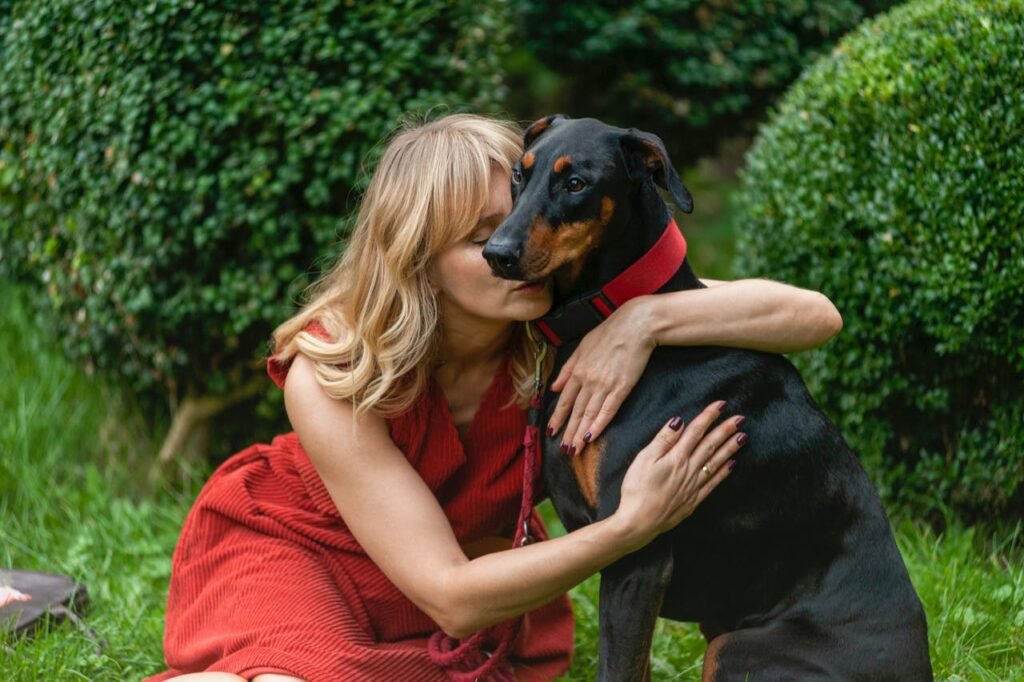
Based on our experience while working with dogs and accounts from Doberman owners, we can proudly say that Dobies are lovely furry companions.
These muscular dogs can also be loyal to their owner and protect them from impeding danger when they need to.
In general, a well-trained Doberman Pinscher is unlikely to cause chaos out of nowhere.
Are Doberman Pinschers Aggressive
Doberman Pinschers are NOT aggressive by nature, but their massive size, powerful bite, and muscular body make them a potentially aggressive dog.
These fearless canines have higher protective instincts than those of being naturally offensive or hostile.
Modern-day Dobies will ONLY become hard-hitting when protecting themselves or their owners from obvious danger.
Keep in mind that these courageous working dogs were initially bred to protect, so they’re highly likely to form strong bonds with their human caregivers and safeguard them when needed.
Despite having strong genes for protection, the overall temperament of Dobermans is greatly influenced by their upbringing and training.
Why A Doberman Pinscher May Be Aggressive
A well-trained Doberman is highly unlikely to be aggressive, but on a few isolated occasions, you may encounter an offensive one due to the following reasons:
1. Bred to protect
Doberman Pinschers have that protective instinct engrained in their DNA which makes them excel in working roles such as guarding.
While this trait has been toned down over the years due to selective breeding, it’s not uncommon for a Dobie to become uneasy when not properly trained and socialized.
2. Fear or anxiety
Just like any other dog breed, Dobermans can exhibit defensive behaviors when subjected to environmental stress causing fear and anxiety.
Some of the factors that may cause your Doberman to be fearful include loud noises and placing them in unfamiliar environments.
Your dog may also get triggered to fear-related aggression when subjected to harsh training conditions and undeserving cruel punishment.
3. Danger
Doberman Pinschers, as with any other dog, may become protective against perceived threats and impending danger.
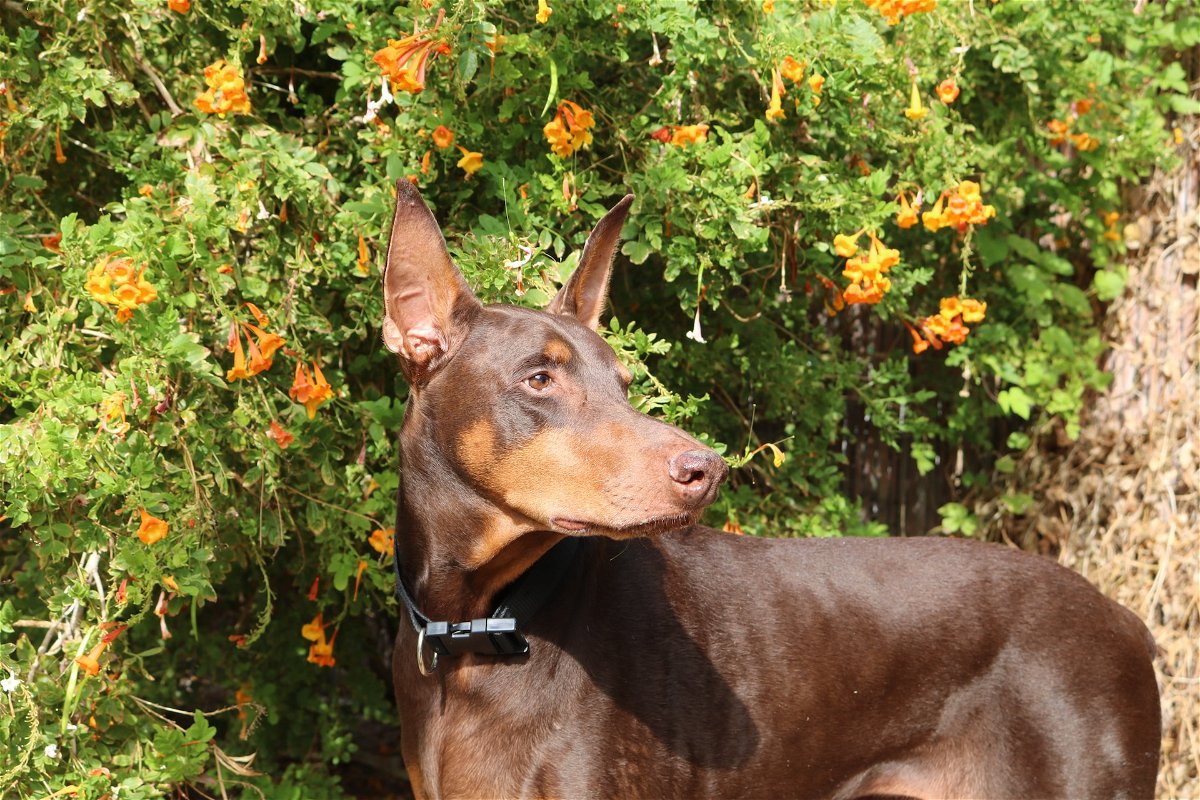
You shouldn’t be surprised if your Dobie is constantly barking and almost lunging toward your visitor, because they may be perceiving them as a source of danger.
4. Trauma or History of Abuse
Unlucky Dobermans with a sad history of abuse or mental trauma may show aggressive behaviors as a coping mechanism.
This will mostly occur when the affected canine is exposed to events or activities that caused them a bad experience, for example being raised in a puppy mill.
For this reason, a charming Doberman may turn out to be offensive toward what made them cry in the past.
5. Irresponsible breeding
Unregulated breeders with irresponsible breeding practices are known to work outside the standards for breeding dogs.
A Doberman Pinscher, who’s a victim of irresponsible breeding, may have genetic predispositions toward poor temperament such as aggression.
In addition to the personality issues, irresponsible breeding may predispose an innocent dog to other issues including reduced immunity and loss of genetic variation.
6. Lack of training
Insufficient training may cause a Doberman to behave in certain ways tending toward mischievousness, aggression, and unpleasant behaviors.
For example, a dog who lacks basic command training may wrongly interpret your hand movements as a threat leading to potential bites or attacks.
7. Poor socialization
Doberman Pinschers who have not been exposed to different people, places, and settings during their puppyhood years may have poor socialization issues leading to aggression.
Isolated Dobies who are not used to seeing lots of people in open places may turn out to be offensive when they finally step out.
Unsocialized canines don’t know what’s expected of them while in public, and they may become nervous and become violent in the process.
8. Health problems
Chronic health problems such as cognitive dysfunction and brain inflammation may prompt the onset of aggression in elderly Dobermans.
Painful diseases such as arthritis and dental problems may also provoke grumpy behavior in the affected canines.
For example, an arthritic Doberman Pinscher may react aggressively when being pestered by a kid.
Other medical conditions that cause symptoms such as fever, sensory loss, and fatigue are also likely to increase the dog’s irritability and may lead to defensive behaviors.
What Are the Signs of Aggression in Doberman Pinschers?
There are many types of canine aggression, but almost all of them can be exhibited through similar signs and actions.
While aggression is a natural mode of communication for dogs, the outward display of attack toward a person or animal is frequently viewed as undesirable or problematic.
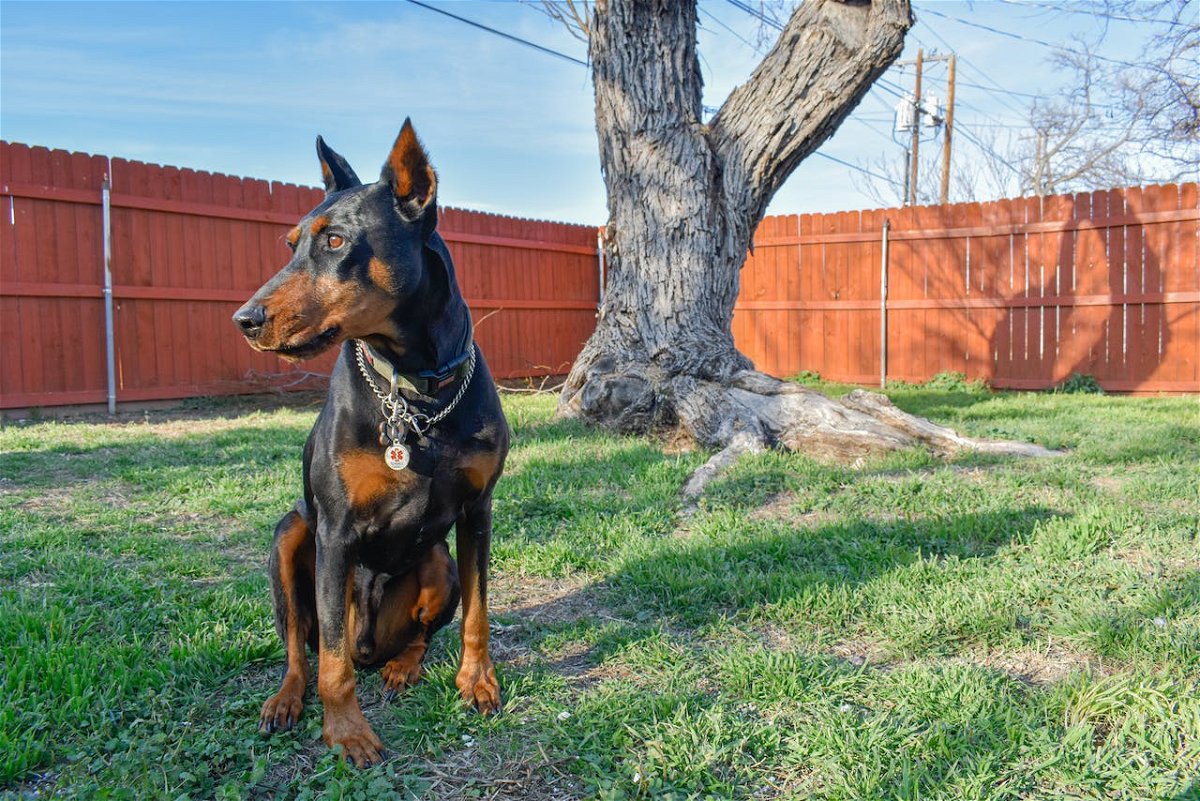
Dobermans often exhibit aggression through various threatening displays such as prolonged eye contact, barking, growling, snarling, snapping, lunging, and biting.
The majority of canine aggression is emotionally driven, often stemming from environmental stress, fear, or anxiety in the brain.
What Should I Do When My Doberman Attacks Me?
Experiencing a situation of aggression and potential attack from a powerful dog like a Doberman can be stressful and dangerous.
It’s prudent to know how to behave in the unlucky event of such an encounter while prioritizing your safety and health concerns.
When your Doberman gives you that hard stare and approaches you in a manner likely to attack, it is important to remain calm during the heat of this moment.
Dogs can sense fear and panic by observing our body language. Maintaining your composure by remaining calm will help de-escalate the situation.
You’ll also want to avoid direct eye contact, because the agitated dog may see this as a challenge or threat.
While remaining calm, you can start retreating back slowly without showing your back to the dog. This will allow you to maintain visibility and control over the unfortunate situation.
Once your Doberman calms down, make sure to take them to the vet to rule out any health concerns that may be responsible for the bouts of aggression.
If your dog is cleared of any medical problems, it’s advisable to seek immediate help from a reputable dog trainer or animal behaviorist.
Shaping your dog’s behavior, especially when they’re adults, may take a lot of consistent work and commitment, but the results are totally worth it.
How To Raise a Non-Aggressive Doberman Pinscher
Raiding a well-mannered and calm Doberman should be the priority of anyone invested in keeping these powerful dogs.
The following are some of the things you can do to bring up a well-mannered Doberman Pinscher:
1. Early socialization
Social training does wonders in shaping the overall temperament of any dog. Once your Dobie gets weaned, you need to start exposing them to all family members.
After your puppy receives all their core vaccines, you can slowly introduce them to the outdoor environment in a controlled way.
Make sure your growing dog meets new people, animals, other pets, and situations to help them adjust to their new environment.
Early socialization will showcase the lovely side of humans and other animals to your dog from a young age and they’re likely to see them as companions and not enemies.
2. Proper obedience training
The second most important thing you can do to prevent your Doberman from being aggressive is to properly train them on obedience.
Some of the basic commands your dog should learn include come, sit, stay, down, and up. This will help your obedient dog to stay calm when you request them.
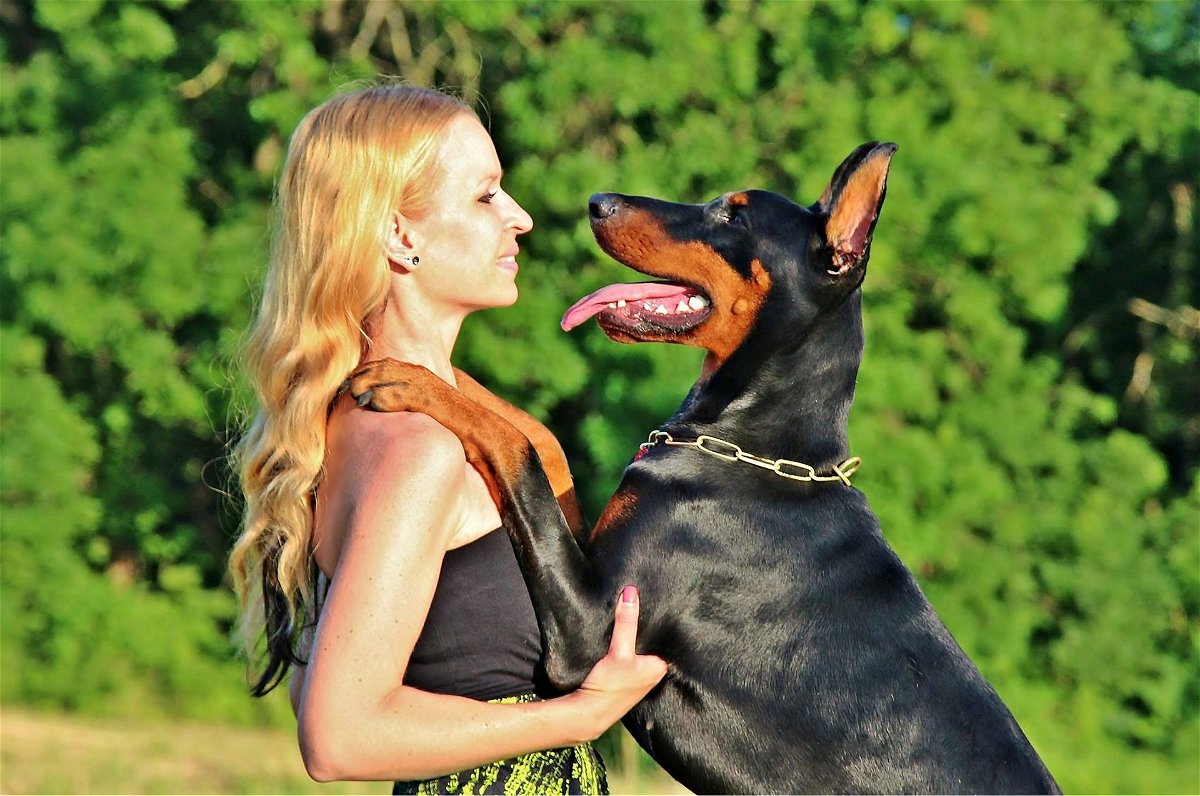
Doberman Pinschers should be trained as early as possible right from their puppyhood stage into their adulthood and senior years.
After completing the set of basic training, you can teach your dog some important tricks to make them more submissive and respectful.
3. Use Positive reinforcement techniques
The key to successful training is using positive training and being patient with your dog. Your Dobie may take more time to learn than others, so you should not give up on.
Positive training helps in reinforcing desired behaviors in dogs and toning down unwanted habits.
When your Doberman does something good, make sure to reward them with a tasty natural treat and verbal praise.
Consistency in positive training will help your dog understand what makes you happy and turn away from bad habits like acting aggressively.
If you have enough time and techniques, you can do the training yourself, but feel free to enroll your furry friend in a puppy class.
4. Avoid the triggers
Avoid doing certain things that may provoke your furry friend to become aggressive and show defensive behaviors.
If your Doberman has dental problems, then you should not touch their mouth because it is painful and may trigger a negative reaction.
5. Love your dog
It is true that love can cure a multitude of problems. Reassure your Doberman that you’re always there for them and they will reduce fear-induced behaviors and aggression.
If your dog has a history of abuse and trauma, it’s only wise to step up and show them unbounded love and try to heal their wound with affection.
Raise your dog with love and care by showing them your bright side and letting them know they will never experience negative treatment again.
Conclusion
Are Doberman Pinschers aggressive? No, they’re not. Just like Pitbulls, Dobermans often get a bad reputation for being naturally aggressive.
Remember there are no bad dogs, we just have irresponsible owners. But like all dogs, Dobermans can be aggressive when provoked to anger or responding to perceived danger.
Towering at an impressive height of 28 inches and weighing up to 100 pounds, Dobermans undoubtedly command a powerful presence among dogs.
Given their immense strength, early socialization, and proper obedience training are essential to keep these remarkable creatures calm and respectful.
Laura is the founder of Furs'n'Paws. She is a also a pet writer and expert with more than 20 years of experience of working with dogs and cats. She developed a very strong love for animals at a young age. Her passion led her to establish a thriving pet sitting and dog walking business in Dubai. As an expert in pet training, behavior, and nutrition, Laura is committed to helping pet owners and pet lovers by offering high-quality information on a wide range of topics.


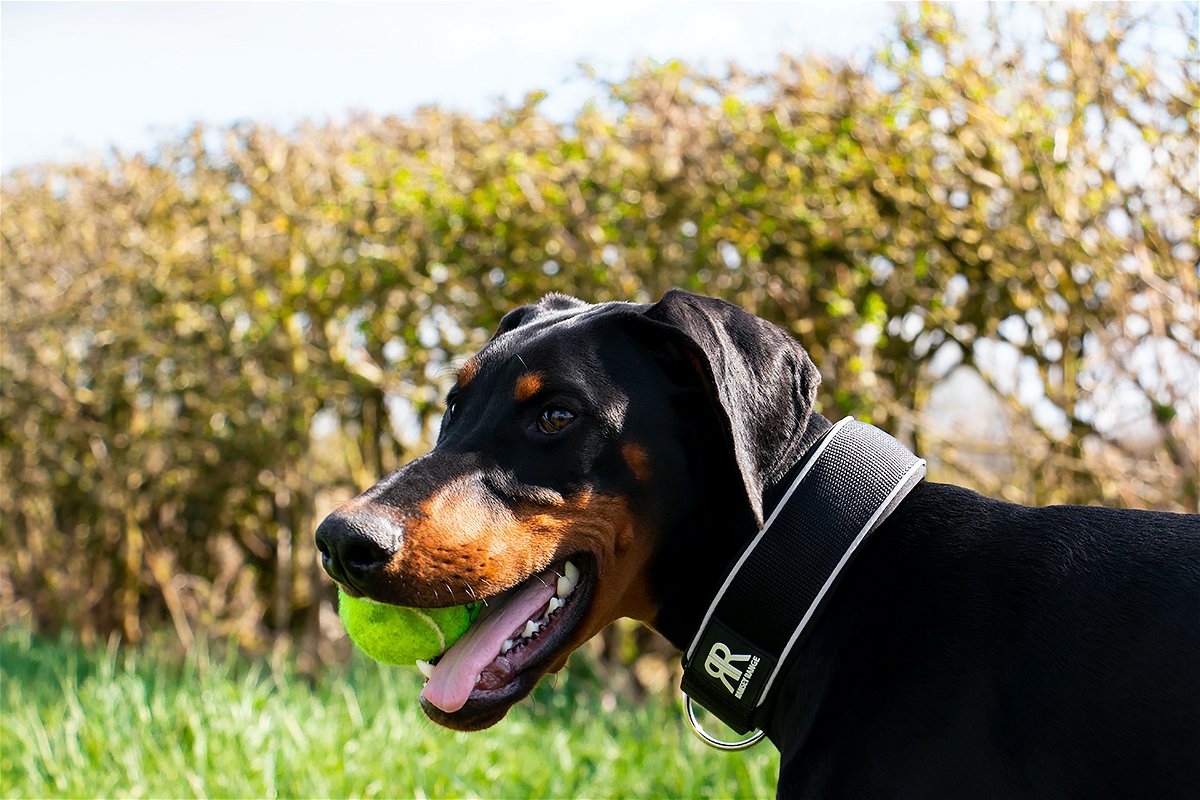
No responses yet